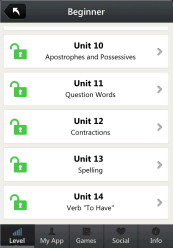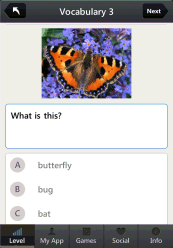English Grammar - Intermediate
Nouns and Quantifiers
Go To Quizzes >>> Nouns and Quantifiers
Few / A Few - Little / A Little
With these expressions of quantity, using the indefinite article gives the sentence a basically positive meaning, whereas using only few/little without the article gives a more negative meaning. Look at these examples:
Examples:
We have a few potatoes. Let's make a stew for dinner.
We have a little water, enough until tomorrow.
There's little reason he'd consider us for the job.
If you are bankrupt, there are few options for you. You'll have to sell the house.
Note: "A few" means "a small number, but more than zero". "Few" means less than you were expecting, less than you need, etc.
No / None / Not
"No" means "there isn't any" and is used before nouns. Not the difference in the verb before countable and uncountable nouns.
Examples:
There's no beer left! What a terrible party!
There are no trees in the garden.
"None" means "not any, zero" and is a pronoun that can be used to substitute both countable and uncountable nouns.
Q: How many children do you have?
A: None.
Note: "None" can take either a singular or plural verb form after.
Examples:
None of the boys are very intelligent.
None of the paintings is expensive.
These words should not be confused with "not" which is used to make verbs negative.
I do not like you.
We have not left yet!
You can't use "not" in front of nouns to mean "not any" although you can use with verbs before the noun. See these examples:
There are not any apples. / There aren't any apples. NOT There are not apples.
Somewhere/Anywhere/Nowhere/Everywhere
The rules for these words are the same as "some" and "any".
|
Positive |
Negative |
Question |
|
somewhere somebody someone something |
anywhere anybody anyone anything |
anywhere anybody anyone anything |
We use the prefix "every" to talk about "all" people, places, etc.
Everyone laughed at me. (every person in the room)
Everywhere was full, so we stayed at home. (every bar or restaurant)
We use the prefix "no" to mean the same as "not any". See how these examples are similar:
I didn't see anybody.
I saw nobody.
And "no-" type words can also be used as subjects of sentences.
Nobody came to the party.
Nowhere feels like home!
Adjectives and Adverbs
Go To Quizzes >>> Adjectives and Adverbs
Prefixes and Suffixes
These can be used to make words negative, stronger, weaker and many more things. Learn prefixes and suffixes to improve your vocabulary. Suffixes are often used to turn nouns into adjectives:
Examples:
Helpful
Joyless
Friendly
Active
Truthful
Adverb Position
Adverbs of frequency come before the verb, but after the verb "to be" or an auxiliary verb.
I am often hungry by 8pm.
I sometimes swim at the weekends.
He doesn't always understand the questions.
Adverbs of manner usually come after the direct object. They can also come directly before the verb.
He picked up the gun slowly.
He slowly picked up the gun.
But never usually after the verb:
He picked up slowly the gun.
Adverbs of time and place usually come at the end of a clause/sentence.
I saw him in the office yesterday.
She was reading there, on the couch.
When you are reading, it's good to take note of where you see certain adverbs.
Note: Many adverbs will have at least two good positions in a sentence. It's important to learn where they can't go.
Examples:
Yesterday, I saw Jane. OR I saw Jane yesterday. NOT I yesterday saw Jane.
English Learning Lounge - iOS and Android Apps |
||

|
Our app for both Android and iOS to help you improve your English!
|

|
Adjective or Adverb?
Some adjectives and adverbs are irregular. Look at "hard".
It was a hard game. He played hard.
Here, "hard" is both an adjective and an adverb. "Fast" also acts like this.
Sometimes, a verb will be followed by an adjective instead of an adverb. Look at the verbs "to feel" and "to seem".
He felt tired. NOT He felt tiredly.
That man seems strange. NOT That man seems strangely.
Note: When you meet adverbs/adjectives that act like this or verbs that take adjectives when you are expecting an adverb, make a note of it so you remember!
Some verbs can take BOTH adjectives and adverbs after, but the meaning changes.
The grass grew quickly. (increase in size)
The man grew tired. (slowly became)
